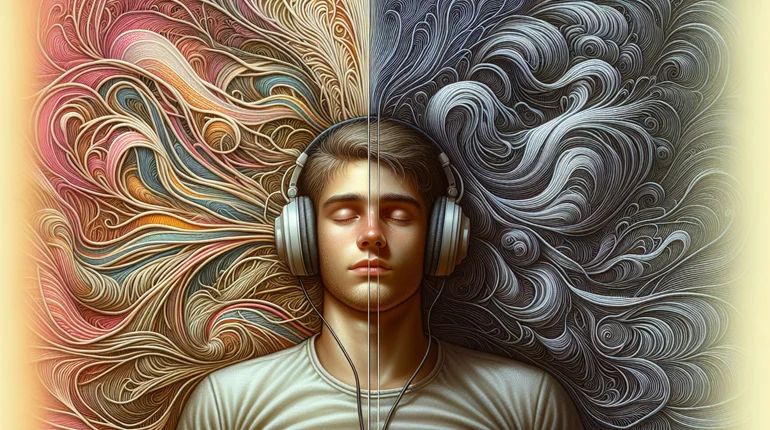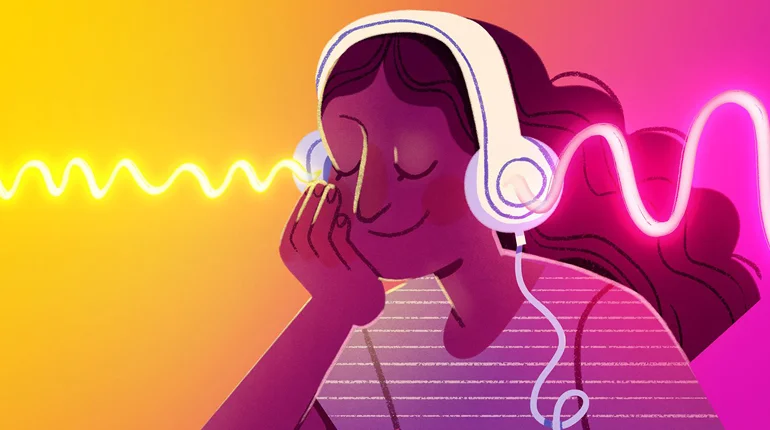Can Binaural Beats Cause Anxiety?

Have you ever tried binaural beats to relax or focus? These popular audio tracks promise to alter your brainwaves and improve your mental state. But what if they’re doing more harm than good? In this article at NeuroBeats, we’ll explore the unexpected connection between binaural beats and anxiety, helping you understand this auditory phenomenon’s potential risks and benefits, and the need for caution when using them.
What Are Binaural Beats?
Before diving into their effects on anxiety, let’s clarify what binaural beats are. Binaural beats occur when two slightly different frequencies are played in each ear. Your brain perceives a third tone, the difference between these two frequencies. For example:
- Left ear: 200 Hz
- Right ear: 210 Hz
- Perceived beat: 10 Hz
Proponents claim this can influence brainwave activity, potentially altering mood and cognitive function.
The Anxiety Connection with Binaural Beats
How Binaural Beats Might Trigger Anxiety?
While many use binaural beats for relaxation, some individuals report increased anxiety. Here’s why this might happen:
- Overstimulation: The constant rhythmic sound can be overwhelming for sensitive individuals.
- Expectation vs. Reality: High expectations of instant calm might lead to frustration and anxiety when results aren’t immediate.
- Individual Sensitivity: Some people may be more susceptible to auditory stimuli affecting their mood.
“It’s crucial to remember that everyone’s brain responds differently to auditory stimulation. What relaxes one person might agitate another.” – Dr. Sarah Thompson, Neuroscientist
The Research Landscape on Binaural Beats
Research on binaural beats and anxiety shows mixed results:
- A 2019 Journal of Evidence-Based Integrative Medicine study found potential benefits for anxiety reduction.
- However, a 2020 review in Psychological Research noted inconsistent findings across multiple studies.
It’s important to note that many studies on binaural beats have small sample sizes or methodological issues. More robust research is needed to draw definitive conclusions.
Factors Influencing the Anxiety Response Due to Binaural Beats
Several factors may determine whether binaural beats cause anxiety:
- Frequency Used: Different frequencies are associated with various mental states.
- Duration of Exposure: Prolonged listening might lead to overstimulation.
- Individual Factors: Personal history, current stress levels, and mental health can all play a role.
Choosing the Right Frequency
If you’re considering trying binaural beats, be aware of common frequency associations:
- Delta (1-4 Hz): Deep sleep
- Theta (4-8 Hz): Relaxation, meditation
- Alpha (8-13 Hz): Calm alertness
- Beta (13-30 Hz): Concentration, alertness
- Gamma (30-50 Hz): Cognitive enhancement
Tips For Safe Use of Binaural Beats
If you’re curious about binaural beats but concerned about anxiety:
- Start Slow: Begin with short sessions (5-10 minutes) and gradually increase.
- Choose Calming Frequencies: Opt for theta or low alpha ranges initially.
- Listen Mindfully: Pay attention to how you feel during and after listening.
- Use Quality Headphones: Ensure balanced audio delivery to both ears.
- Combine with Relaxation Techniques: Try deep breathing or progressive muscle relaxation while listening.
When to Seek Help?
If you experience persistent anxiety while using binaural beats:
- Stop using them immediately
- Practice grounding techniques
- Consult a mental health professional if symptoms persist
Remember: Your mental well-being is more important than any potential benefits of binaural beats.
Conclusion
While binaural beats can be helpful for some, they’re not without risks. Pay attention to your body’s responses, and don’t hesitate to discontinue use if you notice increased anxiety. As with any wellness trend, it’s essential to approach binaural beats with a balanced perspective, recognizing that what works for others may not work for you.
Have you tried binaural beats? We’d love to hear about your experiences in the comments below. And remember, always prioritize your mental health and consult professionals when in doubt.

Ekua is an online content editor for ModafinilHack currently. Before joining our team, she was a senior editor for The Walt Disney Company. Earning expertise and editorial experience, she is now contributing her health, nootropics, and psychology knowledge. She’s a graduate of UCLA, where she majored in English.



